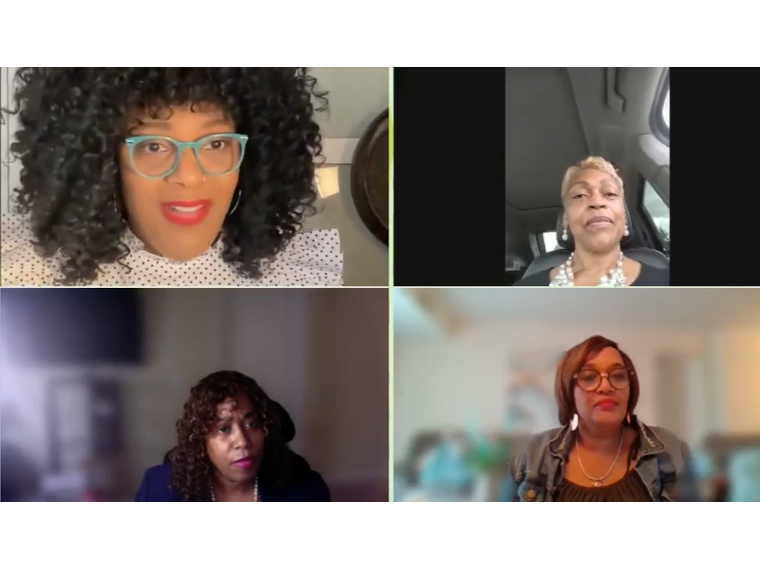Featured photo: Top row, left to right: Sharonda Taylor and Nurse Tonya Battle
Bottom row, left to right: Dr. Latressa Gordon and Tarnesa “Nurse T” Martin
Written by Tanya Terry
COVID changes things and changes the things we take for granted, according to Athena McKay, executive director for Flint Innovative Solutions. One thing people may take for granted but probably shouldn’t is their mental health. Mental health was one of several topics discussed during the 2nd edition of the podcast Taking it to the Streets-Healthy Conversations For Us By Us: COVID-19 and Beyond.
During the podcast a humorous video was shown in which a son is told he just needs something to eat by his father after the son says he is depressed. Then, in the video, the father tells someone on the phone: “We don’t get depressed.”
“Mental health is a real thing,” expressed McKay.
McKay pointed out people of faith often tell each other to pray when they are experiencing depression or other mental health issues.
Sharonda Taylor, a guest on the podcast, has been working in the mental health field for 19 years. Her experience ranges from monitoring homes for people with severe mental illness to providing outpatient therapy, among a wide range of other experiences.
According to Taylor, mental health doesn’t have to make us sad or scared. It could also affect our thinking or our ability to sleep.
“Things are changing as we have people of color working in the field of mental health and sharing their own experiences with mental health,” Taylor explained.
She said she has struggled with anxiety and depression herself.
Taylor also said many times people struggle with symptoms in their physical health that are triggered by their thinking. She added when one is dealing with post traumatic stress disorder or trauma in general they could feel different sensations in their body.
Some events that can cause a person to become traumatized can include getting raped or child abuse, along with a variety of other types of very disturbing events. Not everyone responds to situations in the same way.
In order to ensure good mental health, Taylor suggests getting a mental health assessment. She said going into the assessment, people should know themselves but also realize it’s not going to hurt them to hear what others have to say.
She also recommends individuals have regular physical exams. Some physical deficiencies can cause depression and other issues. When having a physical exam, some of the things the doctor can check are vitamin D and vitamin B levels, iron levels and thyroid levels.
Taylor also said she believes in the benefits of behavioral and cognitive behavioral therapy, which may allow individuals to come up with ideas to cope and manage symptoms without medication.
When medication is needed, Taylor noted it will not “make you crazy,” but will help when prescribed correctly.
Dr. Latressa Gordon, the nurse coordinator for Michigan United, who has also served in the military, said she wanted to hide her symptoms when she was stressed or had panic attacks. However, she said COVID forced her to deal with these issues.
“Be real with yourself,” Gordon said.
The almond shaped amygydala protects us to warn us of danger.
“Anytime it’s reminded of a previous event, it will cause stress so we can run or kick some butt,” Taylor said.
Taylor also pointed out humans have a conscious and subconscious level of thinking. She noted the amygydala doesn’t, however, know real from fake.
“A lot of mental health conditions are hereditary,” Taylor added. “Some of this stuff is not our fault.”
Taylor said a lot of our family members struggled with substance abuse and other problems.
“We all have mood problems, and we’ve all been sad.”
Anyone dealing with overwhelming stress, distress from the COVID-19 pandemic as a healthcare or essential worker, mild to moderate mental health symptoms or who have urgent mental health needs are urged to contact Genesee Health Systems Behavioral Health Urgent Care at 810-496-5500.


